Here’s Part II of this photoessay on the industrial suburbs of Newcastle. If you missed Part I: The Old Swan Hunter, here’s a link.
We were now beyond the wall. Beyond Rome’s furthest reach. The flattened Swan Hunter behind us, we continued east to the sea. On through Wallsend.
This part of the story begins long before Swan Hunter. Long before Hadrian even.
300 million years ago, this was a tropical swamp, an equatorial delta. Over millions of years, the sediment compressed and heated and sank deep into the Earth’s crust. Some parts, by pure fortune, were left exposed at the surface. Glistening black. Alluring to the humans, and, conveniently, by a river.
It was the monks of Durham and Tynemouth who first exploited the coal up here at any scale. By the 1700s, private interests were taking over. By the 1800s, coal had changed the world. Newcastle was the black heart, the Tyne the chief vein.
We came to a church on the edge of Wallsend. It was enclosed by a stone wall and watched over by tall ancient trees. It felt refreshingly pre-industrial, the tracery soothingly curvaceous.
The church warden, Mel, was locking the vestry door. He seemed pleased to tell us about St Peter’s and its history. He said it was very peaceful here and he liked to sit on the bench for inspiration.
“This was the only church between Newcastle and North Shields,” he told us. “You have to imagine none of this was here,” he motioned to the school and the houses. “Just this church in the middle of nowhere.”
He said that ships would put in at Willington Gut after months at sea. They’d come to church and bring the unburied dead up.
“There are many mariners and ship captains here,” he said. “Their names will be wearing off now.”
We’d heard there was a mass grave of coal miners here too.“Ah, there are two.” Mel lead us round and pointed to a couple of plaques. “Were you at the commemoration yesterday? It was the anniversary of a collapse the other side of town. 36 men and boys in that one.”
The largest here was 102, in 1835. “The youngest was 5,” Mel told us, “His grandfather was the eldest. They think there was a methane leak and someone struck a match.”
It happened in the largest pit near here, sold by Durham Cathedral to a banker named William Russell in 1787. He amassed a fortune, bought Brancepeth Castle, and his son became the richest commoner in the country.
After the disaster, Russell benevolently paid for the funerals. He didn’t evict the wives from their homes either, which was uncommon. Neither did he pay for headstones. The plaques on the wall had been put there for the 200th anniversary—the miners were not forgotten.
Mel pointed to the far corner where the mass grave was, conspicuous for its emptiness. Just a patch of boggy land. We should be careful going over there, Mel said, graves were known to sink.
For decades, it was presumed that coal powered the Industrial Revolution and the British Empire, but recently historians have begun to question it, demoting it to a mere bit player in the bigger story. Damning for the countless horrors endured if so. On average, 1000 people died for every year coal was mined in England.
Its role in railway history is undeniable though. Some of the first mechanised rail locomotives crawled out of the throats of the mines here, transporting coal long before people. The first railway, pulled by Stephenson’s Rocket, connected pitheads south of the river. It opened 200 years ago this year.
We asked Mel how long it would take to get to the coast, but he wasn’t sure. He’d never thought to walk it before. We must stop, however, at the Low Lights pub in North Shields.
“I used to call it the Low Life, because it really was,” he chuckled, “But now it’s up and coming. I think the whole of North Shields is—it’ll be very trendy soon.” He said there were lots of restaurants and bars popping up there. We would like it for sure.
The road east curved down the hill, following alongside the graveyard to the bottom of the valley. It was easy to imagine the isolation Mel evoked.
There were no buildings, save for an old terracotta pub and a concrete road bridge further up the valley. To our right, the Wallsend stream trickled towards Willington Gut and the river. We imagined the mariners paddling up to church.
There were many parts of Tyneside that J.B. Priestley did not like when he visited in the 30s. This part—between Wallsend and North Shields—was chief among them. He said that if T. S. Eliot wanted to write about a real wasteland, he should come here.
In Priestley’s mind, Tyneside had received nothing for its achievements and bitter toils. As he stood shivering, he wondered if it had been worth it.
Here was the pleasant green estuary, blackened and ruined, it seemed, forever. Here was a warren of people living in wretched conditions, in a parody of either rural or urban life, many of them now without work or wages or hope, not half the men their peasant ancestors were. They seemed to have gained as little as the befouled river itself. And the fortunes, the piles of gold that the alchemy of industry had conjured from this steam and filth and din, where were they?
Brancepeth Castle wasn’t on our route.
Up the opposite hill, we came into Howdon. There wasn’t much to observe. It was for all intents and purposes, a suburb. Like any in the country. The industrial mess that Priestley saw has long since been cleared. Partly by German bombs, partly by slum clearances.
We noticed one resident had done their best to cheer the scene. Their front garden was arranged with trellises, statues and balls of round green shrubs. Some were in flower, just about the only colour in the area. A sign read, Garden Tours 50 cents. My Happy Place est 2023.
On the edge of Howdon, the houses gave way to a large roundabout. The sunken A19 invisible as yet but audible. The rain intensified as we crossed it. The traffic splashed noisily. We turned our collars up and ploughed on.
Playing fields lay empty to our left, under a string of huge pylons. The pitches didn’t appear to have lines, just netless goals facing each other from afar. We wondered when they played if not on Saturday. It felt for the first time like the suburbs of Newcastle were thinning. The gaps between the puddles growing.
Which brought us to North Shields. The end was nearly in sight. Posters in a doorway advertised funfairs and wrestling shows and a tribute band called Scam Fender. This was his home town after all. These suburbs felt a little more distinct than Howdon’s, less part of Newcastle somehow.
We followed Mel’s advice and made for the Fish Quay in the east of the town.
Like Newcastle, North Shields has medieval roots, set up by the monk Germanus to trade coal in the 1200s. It might have grown to the size of Newcastle had the larger neighbour not become jealous.
Newcastle townsfolk attacked it and stole a ship in 1267. But the real blow came from the king. Edward I owned a share of Newcastle’s port and none of North Shields’. He ordered its jetties to be destroyed. It never recovered as a trading port.
Instead, it focused on fishing. “Our harvest is from the deep,” says the town motto. Fishermen would sail as far as Iceland for ling and cod, which was salted and sold in the city.
By the 20th century, the catch was skate, coley, haddock, dogfish and cod. Herring was smoked on the quayside, carried from the boats in baskets woven by the blind on Howard Street. Unsold stock was tinned for Tyne Brand and shipped across the world. The surplus was mashed to make guano for the fields until complaints about the smell sent the factory to Hull, then Aberdeen.
We looked across the Quay from above, then dropped down steep, slippery steps to the water level. The part of town on the plateau was built in the 1800s, but the old town and the Fish Quay go right back to Germanus.
There used to be 100 inns and taverns between the Low Lights and the Bull Ring in the West. A stretch famed in the 1700s for its vice and depravity but also for its skilled sailors. Press gangs were drawn to the scent like orcas. Once, they cordoned off the town and took 250 men and boys on a single night, sent to fight Napoleon.
The quayside was largely empty that evening. We looked out across the Tyne. It was gloomy and brooding. We imagined the mighty ships of Swan Hunter, The Mauritania or Geordie Pride, hundreds of meters long, chugging away for their maiden voyages, cheered by crowds. Or colliery rigs and steamers, heavily laden, bound for the fires of London.
North Shields witnessed all come sliding out the shute.
We found the Low Lights pub. There were several derelict buildings around it. Hollowed out windows, crumbling roofs. A cold wind was blowing off the sea. The pub was small, the ceiling low. It was full, loud and warm.
We got to the bar and ordered a pint. Well earned, we reckoned. We were nearly there.
In the next-door room, people sat huddled, singing merrily, swaying side to side. A man in the middle was playing the guitar.
Play Delilah! came a shout from the corner. A man with a handful of pints sloshed through a gap. A woman in the corner was breastfeeding. The guitar obliged. Why, why, why… Delilah! the room returned. Sweet Caroline came next, with the expected reception. We sang along too, hands in the air.
We considered a second pint, maybe settling there. But we still had a mile or two to the coast. We’d better finish it.
The lady by the door clutched my sleeve as we left. She said they were pleased to have us. They’d come over on the ferry from South Shields for the man with the guitar’s 61st birthday.
“He’s a musician, see,” she said, slightly slurred, “The guitar was on the wall and we just took it off. Don’t know if we were allowed…” she cackled. “This is what it’s all about, isn’t it? Spontaneous moments like this. You and me, British people.”
Back into the cold and the rain. Up the barren slope under the railway. Leaning into the weather for the last stretch. A pub had a plaque to say it served the guards in the prison. We spent a long time wondering if the concrete building opposite was the prison. It wasn’t. It was housing. Which says all you need to know.
Then at last, we reached Tynemouth. We’d shaken the shackles of the city for good now. It felt like a regional town, totally apart. Georgian architecture and a town square. A plaque told us Garibaldi had stayed here and another said Jimi Hendrix ate fish and chips on this very bench.
We didn’t see much of it besides that. We stayed long enough for a pint and a look out over the surf into the grey beyond of the North Sea. It was dark by now.
Then we were rattling back on the Metro. A distant descendant of the old railed mine carts that once crawled this very same way. The Newcastle Roads they were called. We couldn’t see anything outside. Just rain and our own reflections.
We went to the Crown Pasada when we got back to the city. It was a favourite pub of my brother’s. We settled onto the green leather benches, legs weary, but we were excited, in the way you are after a day of stimulation, going over all we’d seen.
Soon we were chatting with the punters on the table over. “Ahh you went to the Low Lights,” said Aileen, “That’s a lovely pub. Sam Fender used to work there. Did you see the beer tap?” We hadn’t, no. “Ahh, it’s his first ever BRIT award! He donated it.”
We told them about our walk. They told us about growing up in Byker and the old haunted Simpson Hotel. Life on the rigs in the Gulf and the Caspian Sea. Claire had been a punk in the 80s on the King’s Road in Chelsea and knew Vivienne Westwood for a time.
We stayed til close. Roaring steadily louder. Realising that for all its history, this is why you come to the Northeast. The welcome, the friendliness.
It may be cold, wet and grim outside, but it’s always warm in a pub.




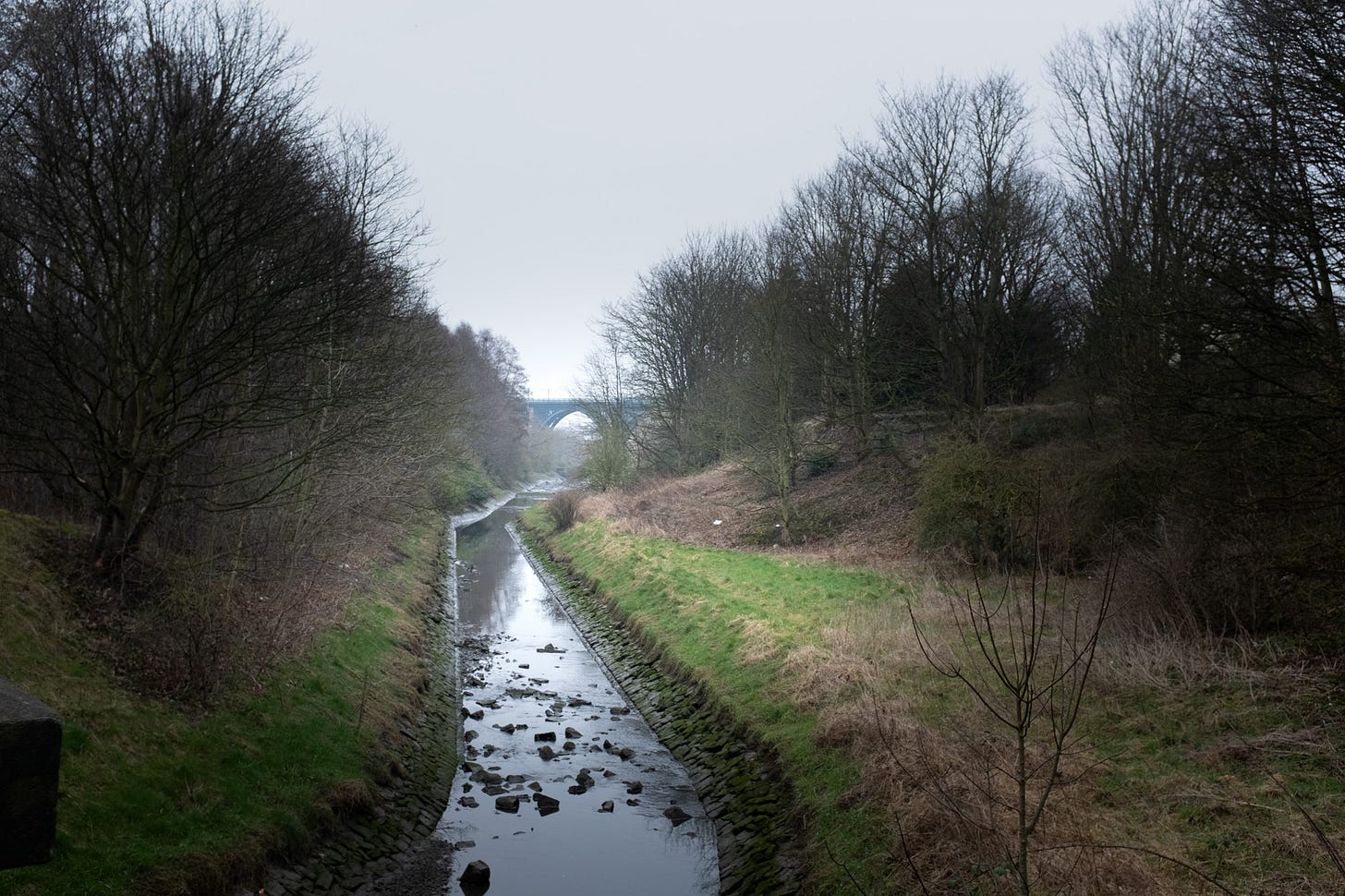
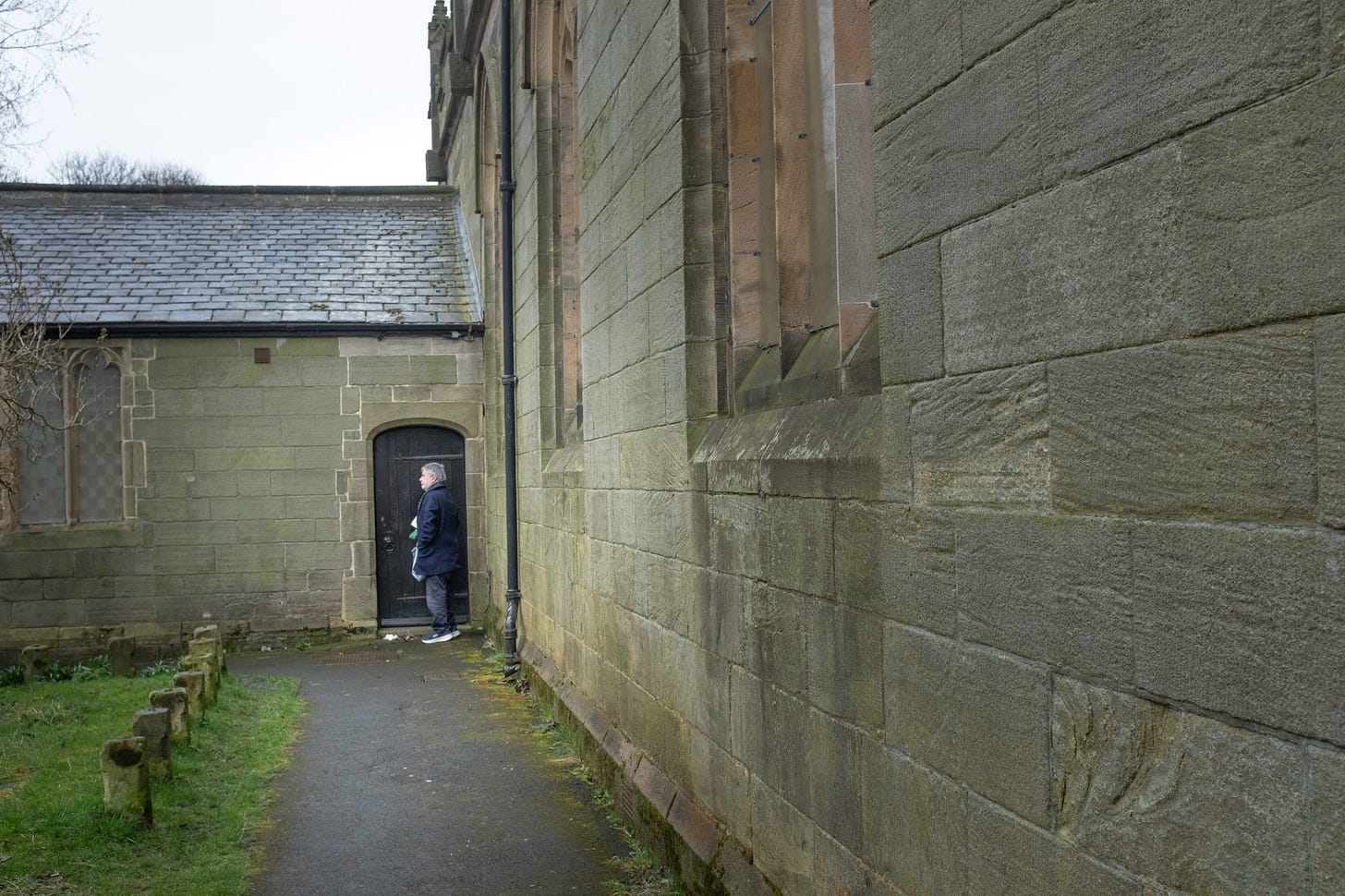
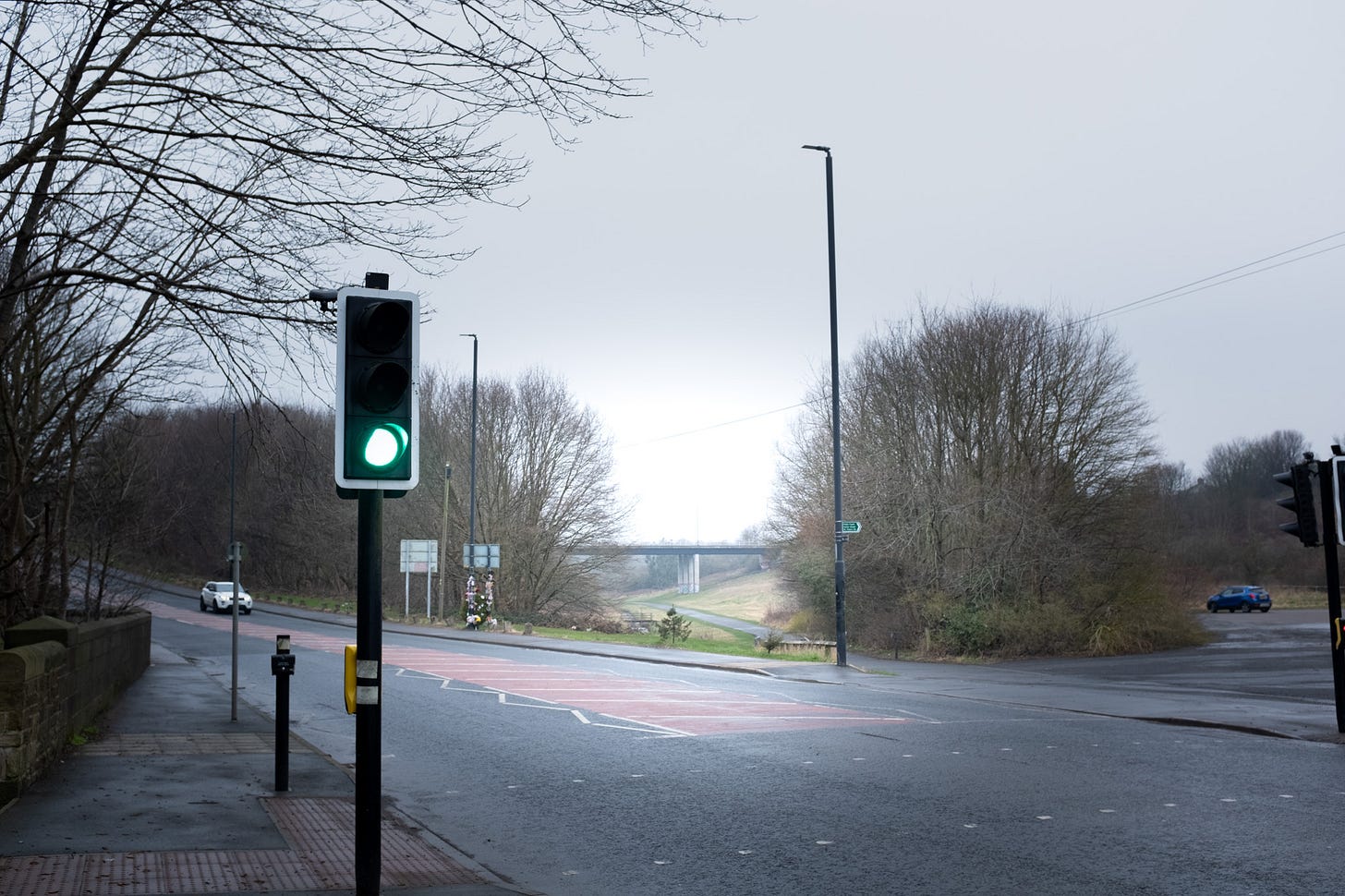
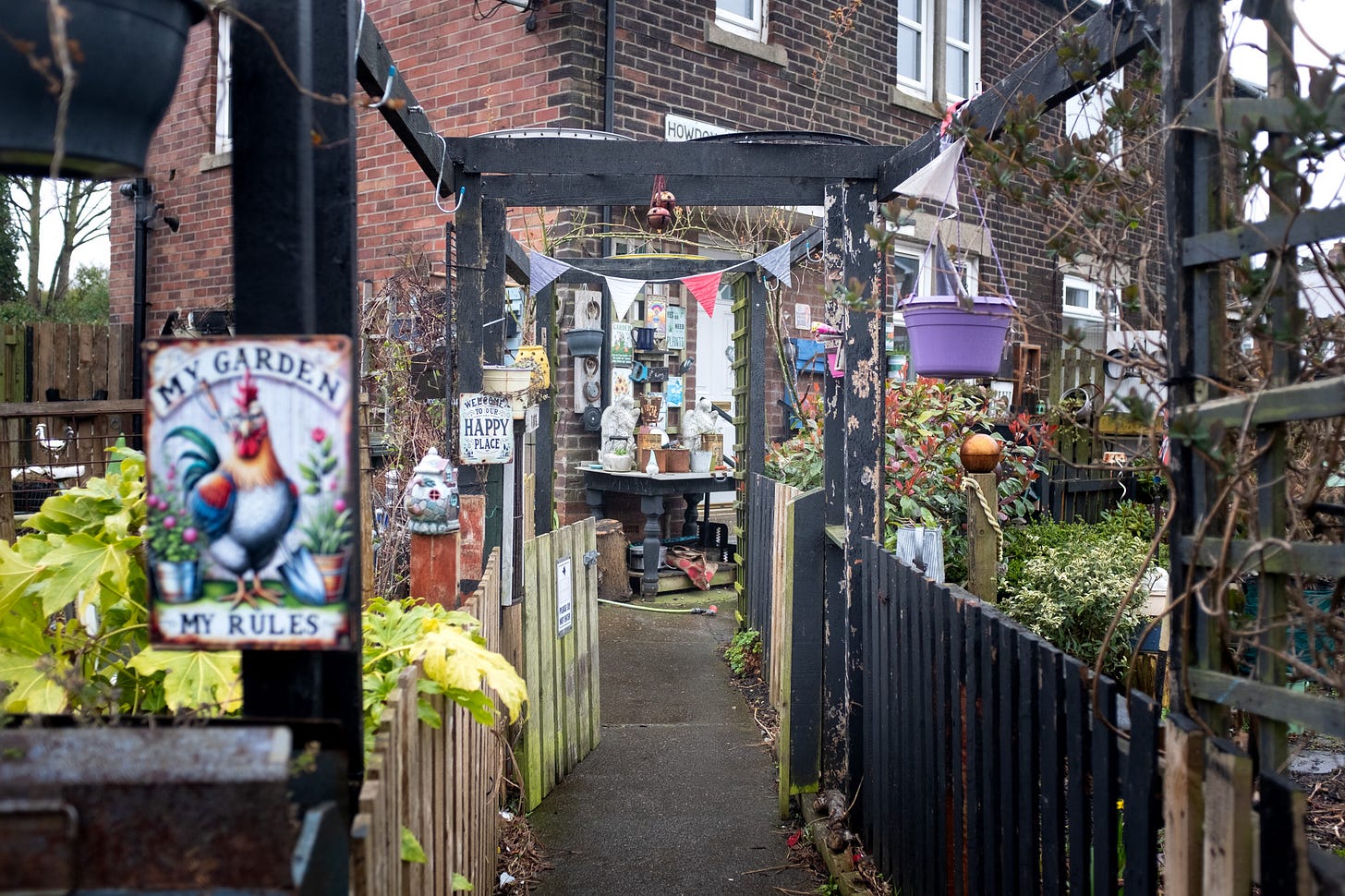
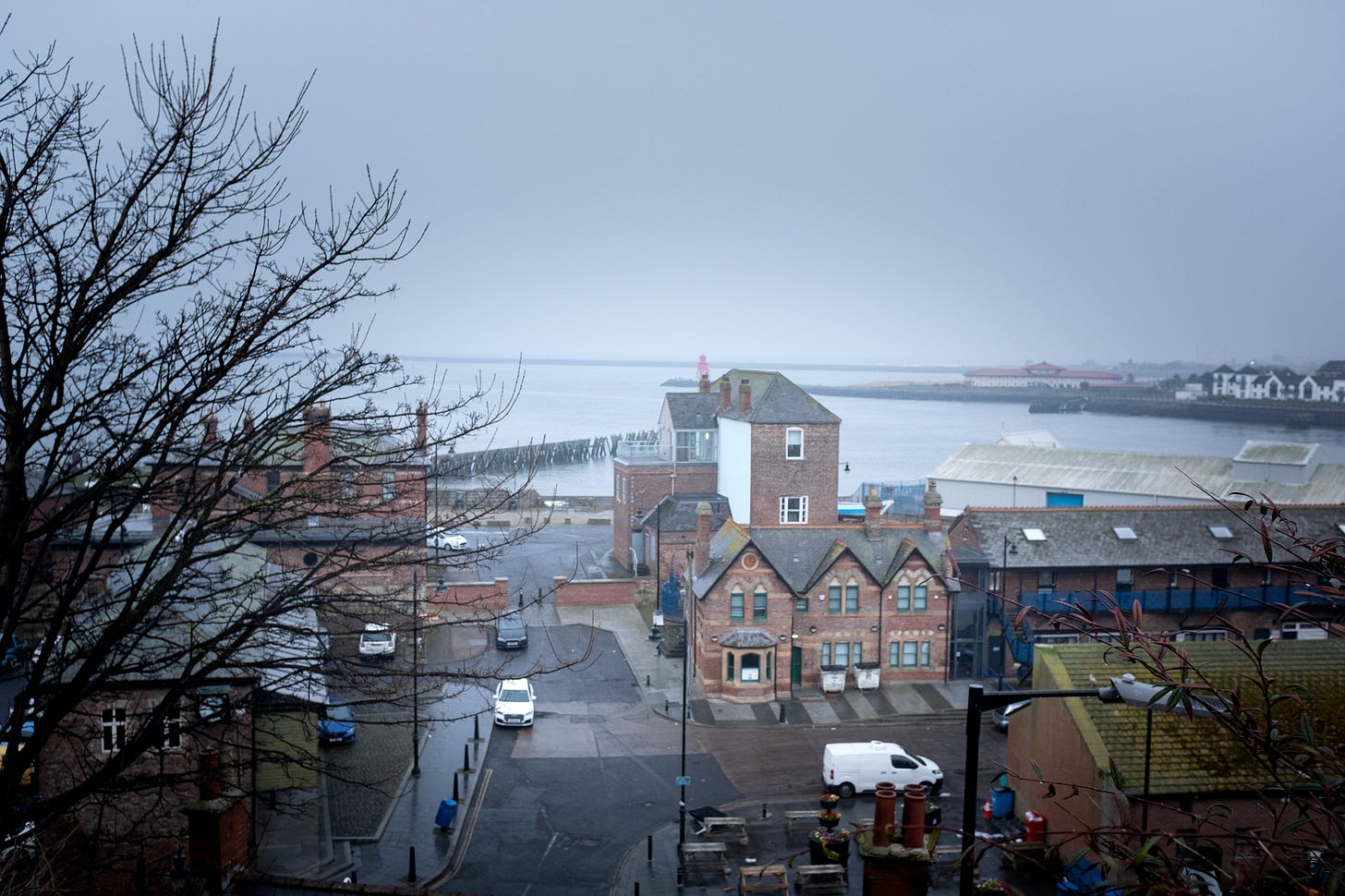
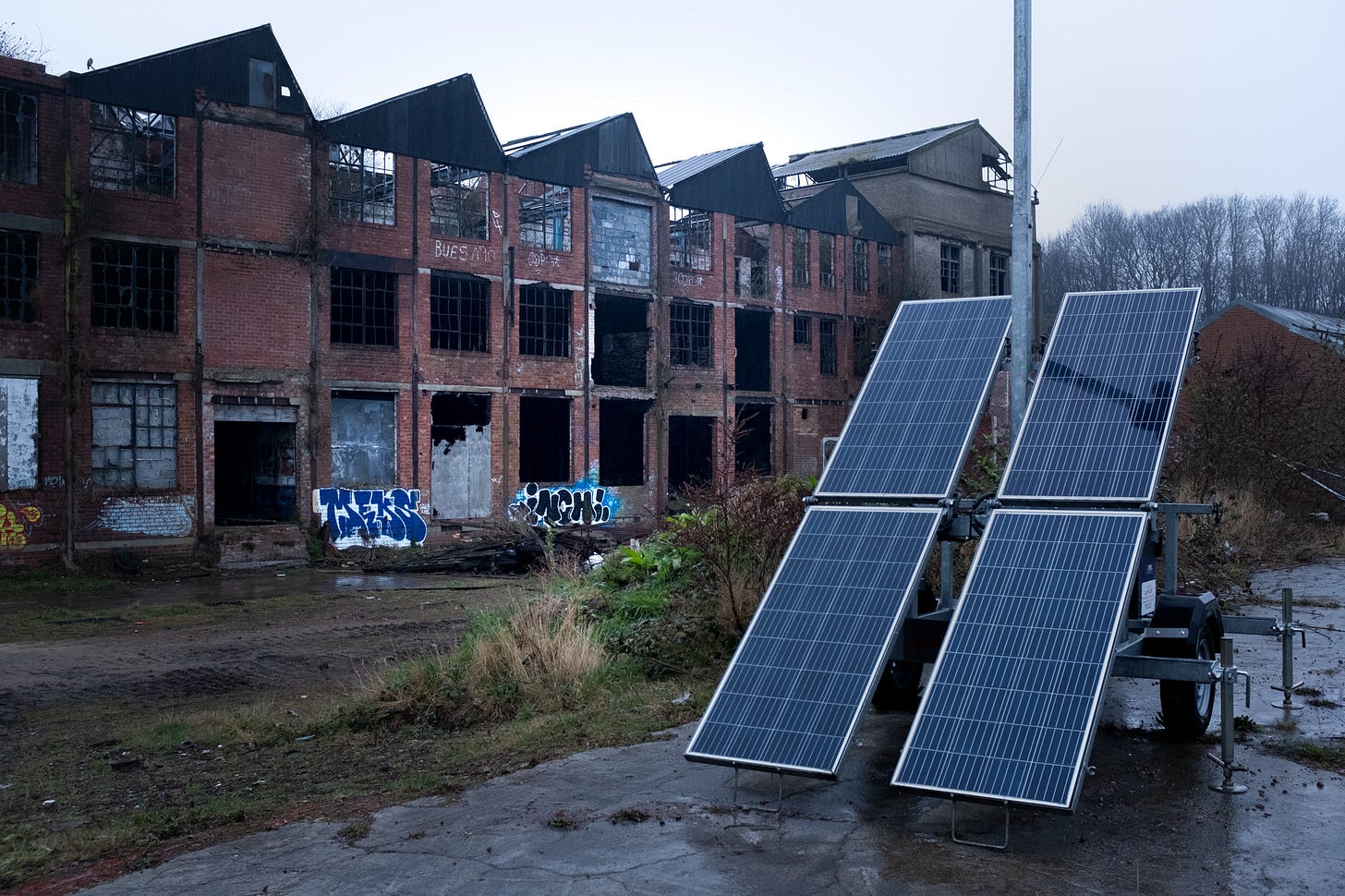
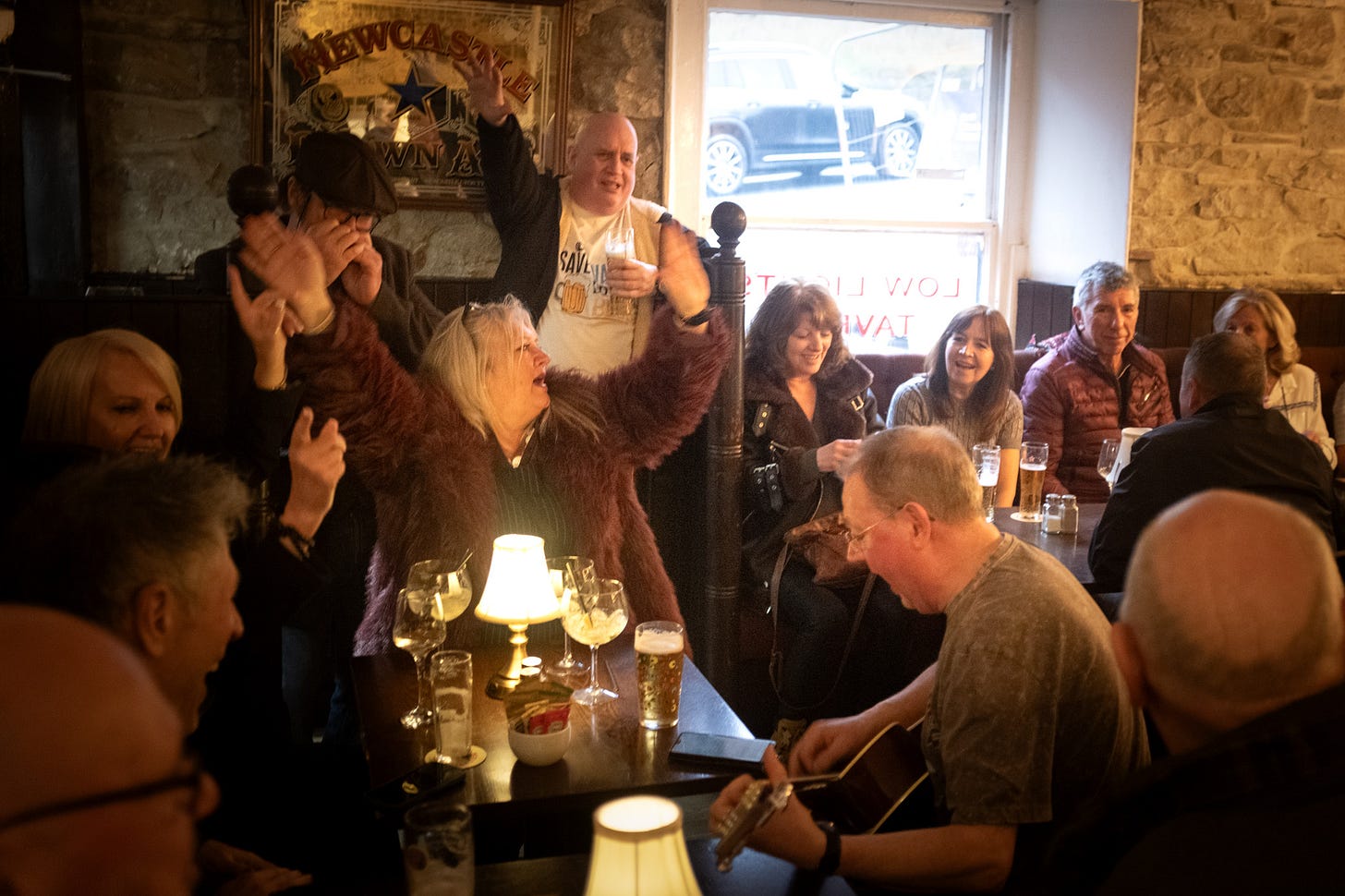
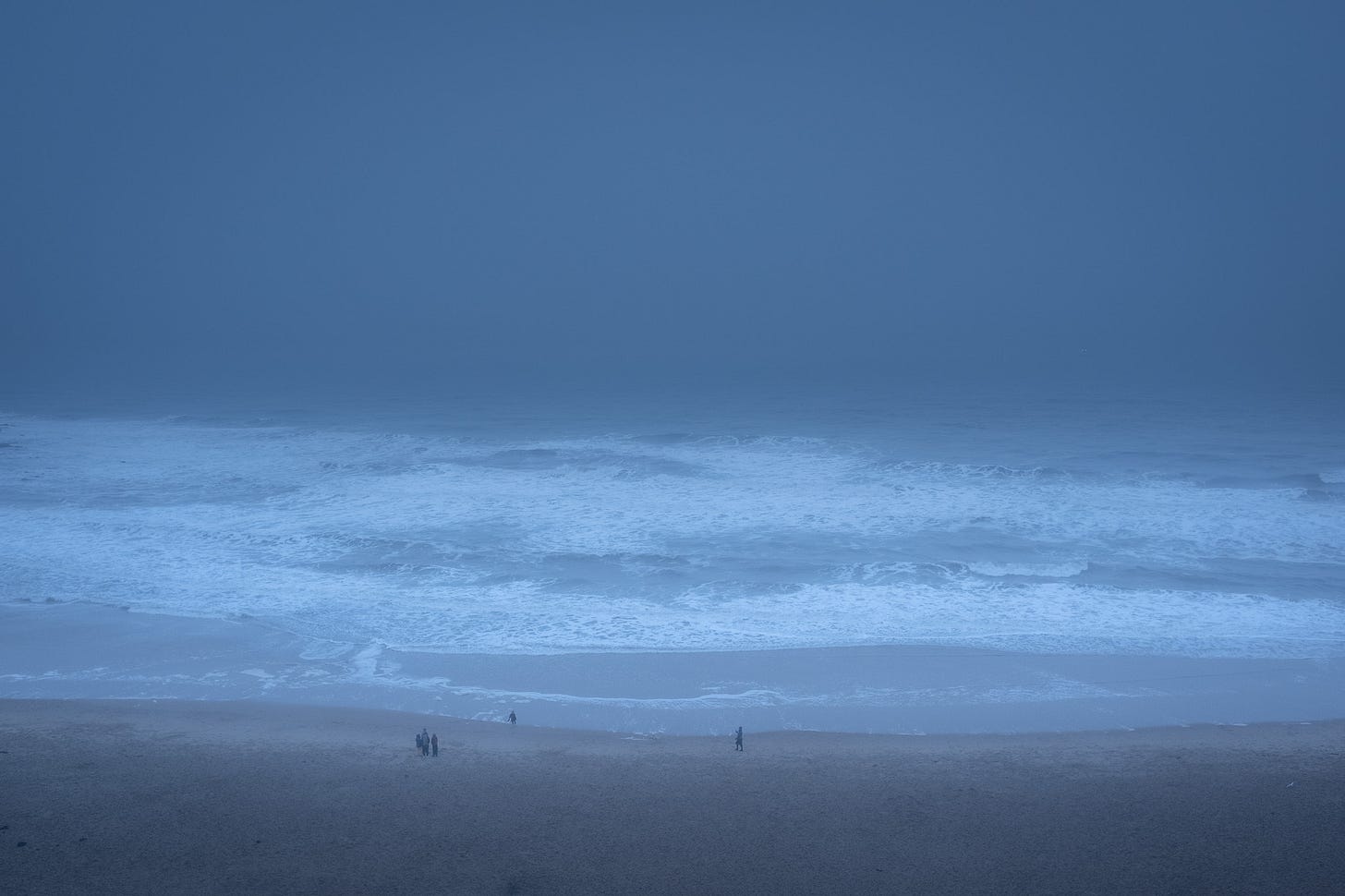
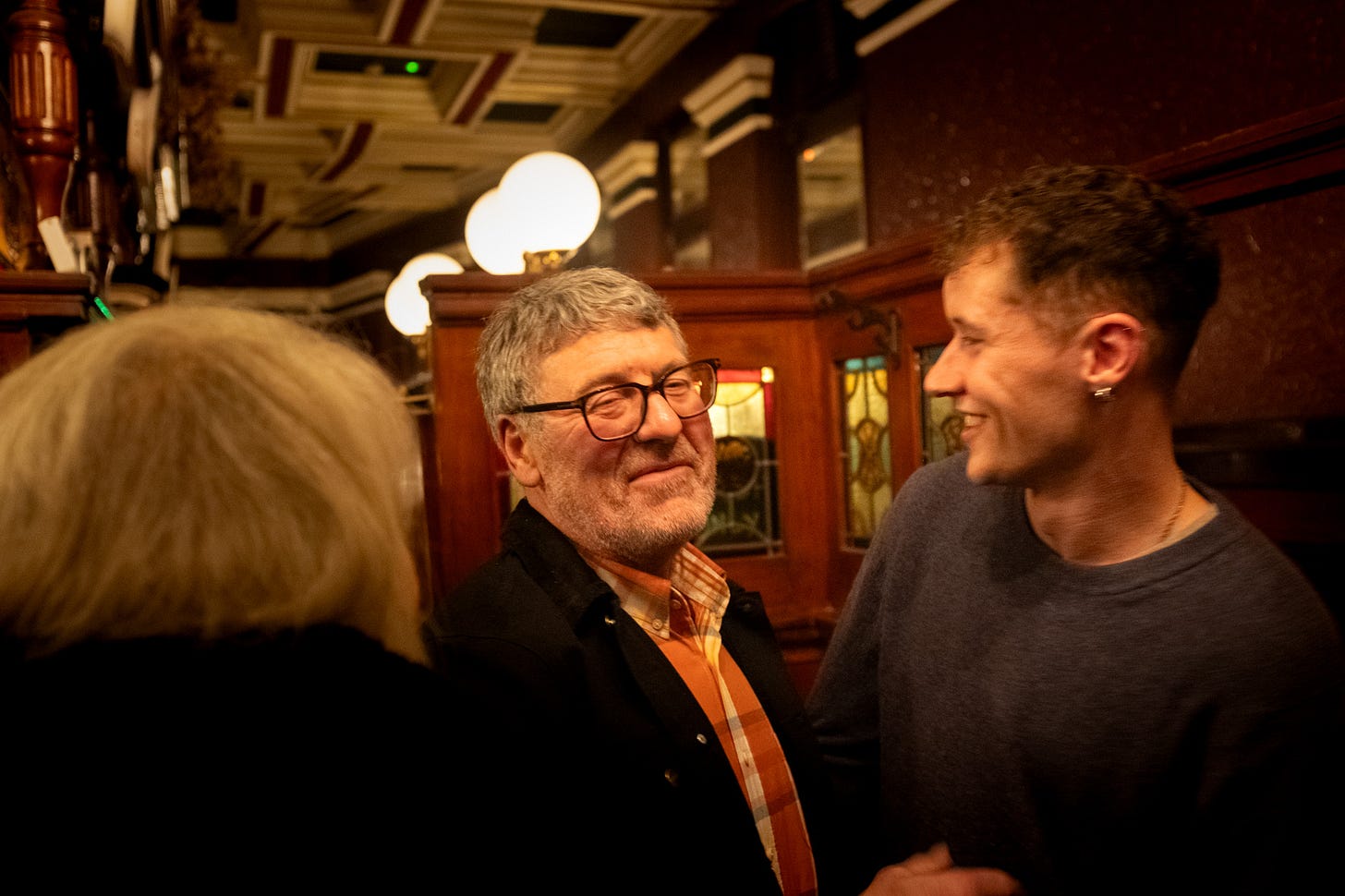
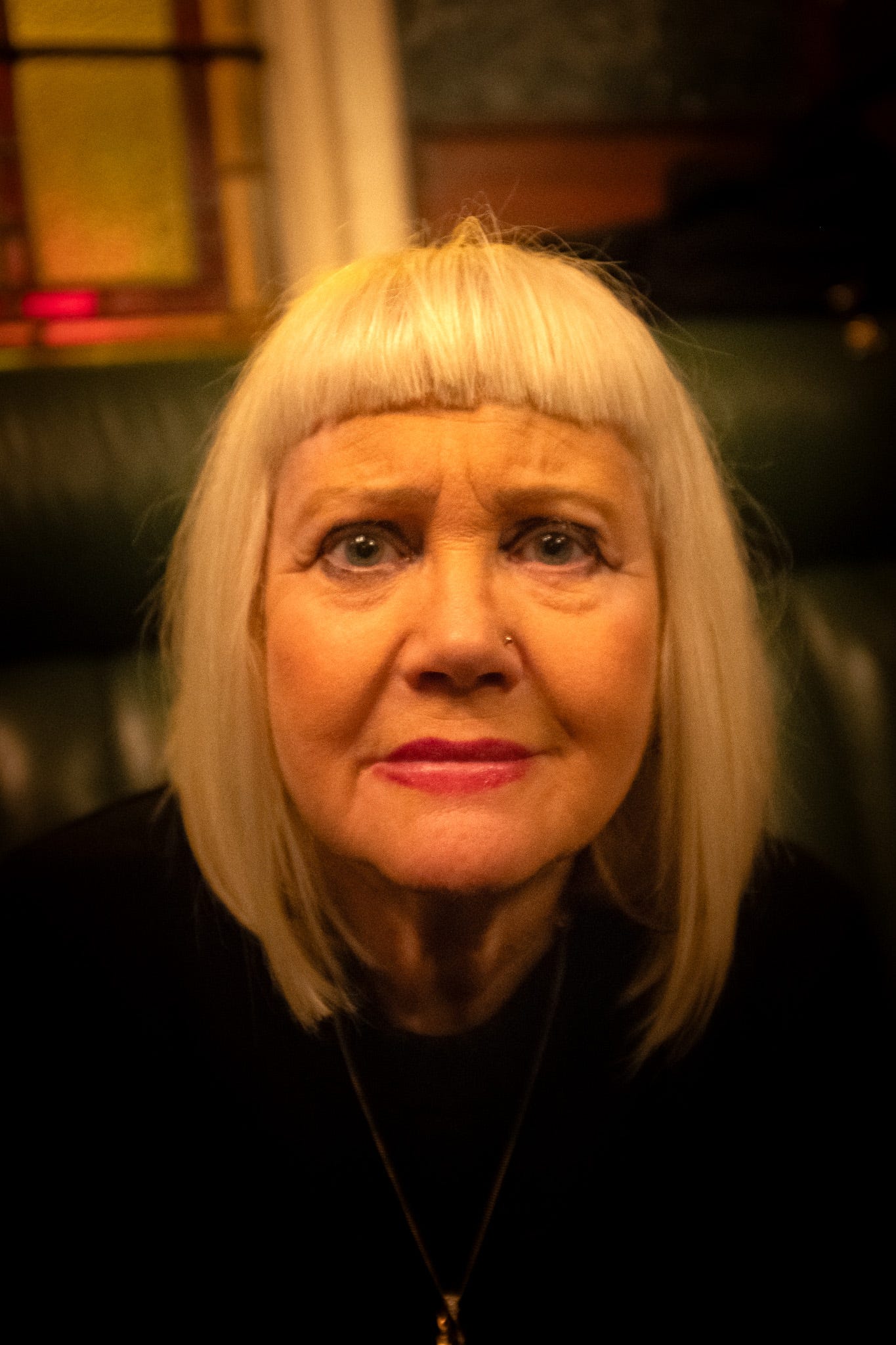
Great piece! Although as a born n bred local you won’t mind me saying it’ll never make it on the ‘Tourism Guide’ shelves 😉 except for the Posada of course and we’d all really prefer that didn’t attract any tourism trade.
As usual much enjoyed and recognised a lot of which you write, Nico. Several of my pieces are of North Shields, Tynemouth and the area and I often go along to the Old Lowlight and the wonderful talks they hold there. And oh, the Crown Prosada. Even mentioned that again in my last piece. What a pub.